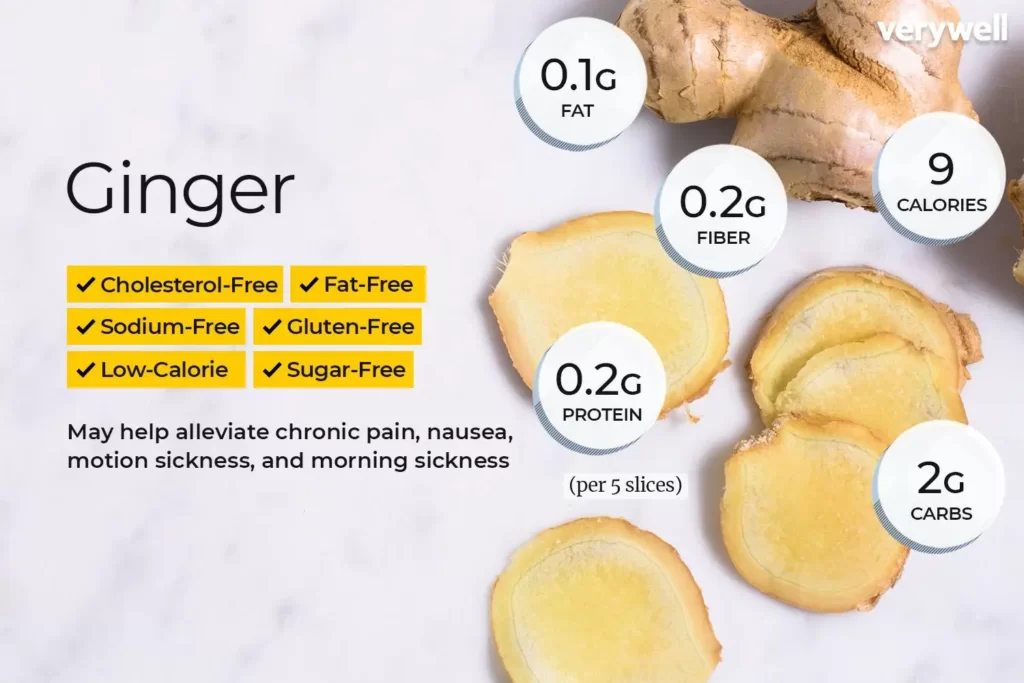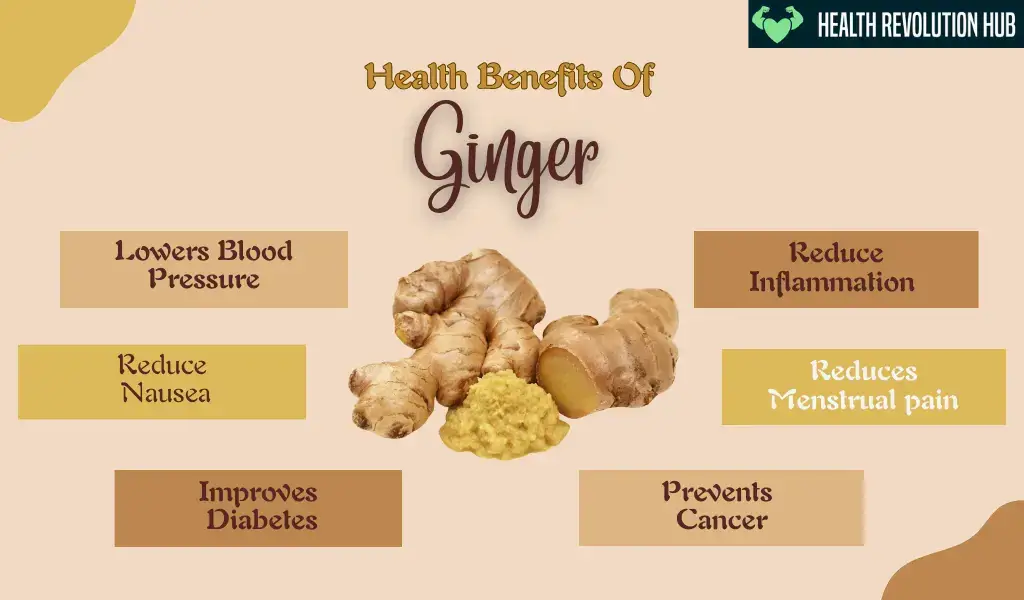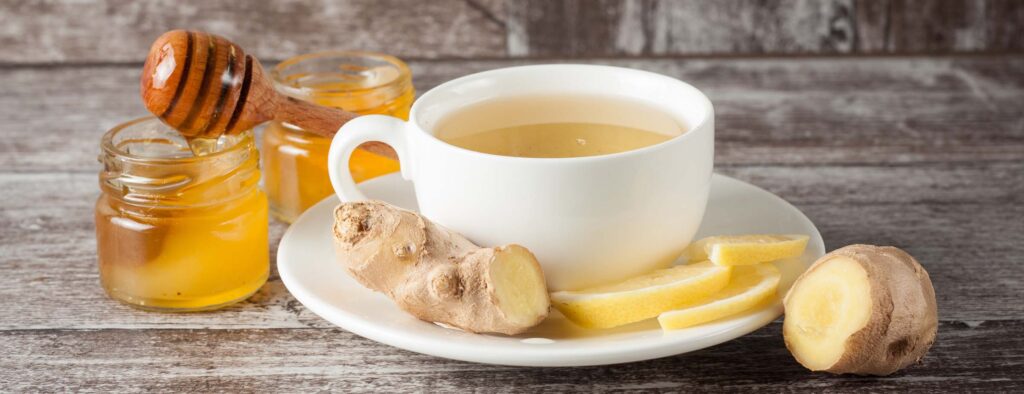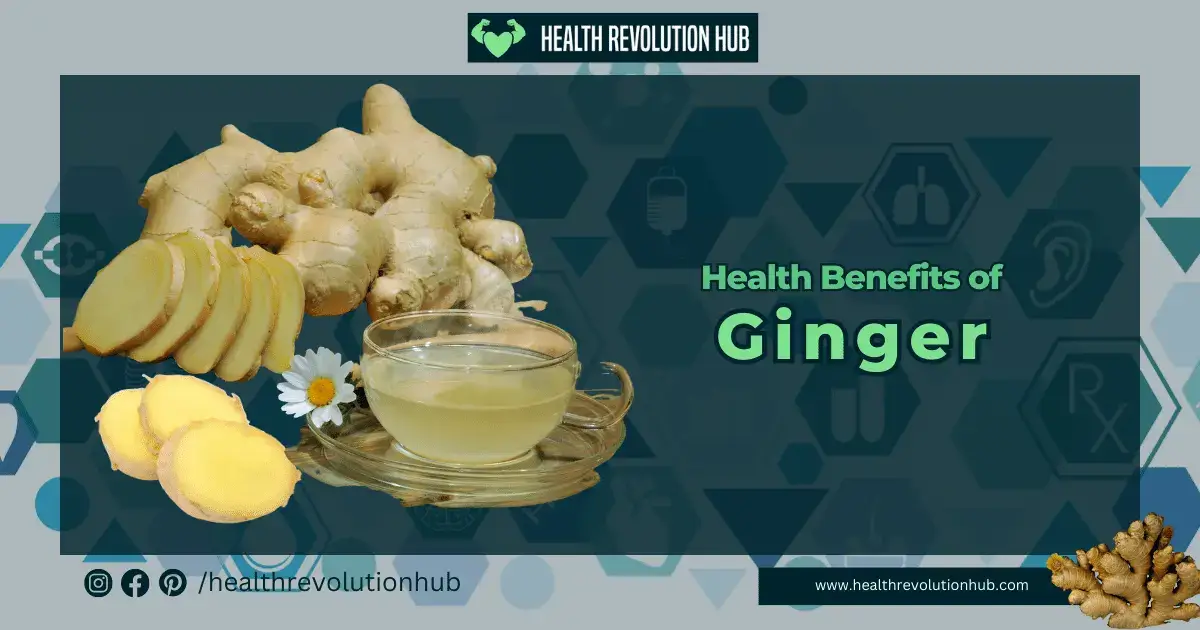Introduction
Ginger has long been celebrated for its dual role as a spice and a medicinal herb. Its popularity spans across cultures, making it a versatile ingredient in various cuisines. The several health benefits of ginger make it a valuable addition to your diet.

In this article, we’ll explore the myriad ways ginger can boost your health, from its historical roots to its nutritional profile and remarkable health-promoting properties.
Origins of Ginger in Southeast Asia
Ginger traces its roots back to Southeast Asia, where it was first cultivated thousands of years ago. Its distinct flavor and aroma quickly made it a favorite among ancient civilizations.
Historical Use in Traditional Medicine
Throughout history, ginger has been treasured for its medicinal properties. Traditional healers used it to treat a variety of ailments, ranging from digestive issues to inflammatory conditions.
Nutritional Profile of Ginger

Overview of Ginger’s Nutritional Composition
Ginger is not only flavorful but also packed with essential nutrients. Each serving offers a remarkable combination of vitamins, minerals, and antioxidants.
Key Nutrients Found in Ginger
Ginger contains a potent compound called gingerol, known for its anti-inflammatory and antioxidant properties. Additionally, it serves as a source of vitamins such as vitamin C, and vitamin B6, and minerals like potassium and manganese.
Caloric Content and Dietary Significance
For those conscious of their calorie intake, ginger offers a low-calorie option. Its dietary significance lies in its ability to enhance the nutritional value of meals without contributing excessive calories.
Health Benefits of Ginger
Ginger’s health benefits are truly remarkable, covering a wide spectrum of wellness areas.

Digestive Health
Relieving Nausea and Motion Sickness Ginger has long been hailed as a natural remedy for calming an unsettled stomach, alleviating feelings of nausea, and combating motion sickness.
Alleviating Indigestion and Bloating Ginger aids in digestion by stimulating the secretion of gastric enzymes, facilitating efficient food breakdown and absorption. This results in reduced indigestion and bloating.
Reducing Symptoms of Morning Sickness in Pregnant Women Expectant mothers often find relief in ginger to alleviate the discomfort associated with morning sickness, making it a safe and effective natural option.
Anti-Inflammatory Properties
Gingerol’s Role in Reducing Inflammation The active compound gingerol possesses potent anti-inflammatory properties, which can help alleviate various inflammatory conditions, including arthritis and joint pain.
Potential Benefits for Arthritis and Joint Pain Several studies suggest that ginger may decrease pain and stiffness associated with arthritis, presenting an alternative or complementary approach to traditional treatment methods.
Implications for Chronic Inflammatory Conditions The anti-inflammatory properties of ginger extend beyond arthritis, showing promise in managing chronic inflammatory conditions such as ulcerative colitis and osteoporosis.
Immune System Support
Enhancing Immune Response Ginger’s immune-boosting properties can strengthen the body’s defense system, helping to ward off infections and illnesses.
Fighting off Infections and Illnesses By promoting a robust immune response, ginger aids in the body’s ability to combat infections, reducing the severity and duration of illnesses.
Ginger as a Natural Remedy for Colds and Flu Ginger’s antiviral properties make it a popular choice for soothing symptoms associated with colds and flu, providing relief from coughs, congestion, and sore throats.
Cardiovascular Health
Lowering Blood Pressure and Cholesterol Levels Regular consumption of ginger has shown potential in reducing blood pressure and cholesterol levels, thus decreasing the risk of cardiovascular diseases.
Improving Overall Heart Health Ginger’s ability to enhance circulation and reduce oxidative stress contributes to improved heart health, promoting optimal cardiovascular function.
Reducing the Risk of Heart Disease The combination of ginger’s anti-inflammatory and antioxidant properties helps combat risk factors associated with heart disease, offering a natural approach to prevention.
Pain Management
Ginger’s Analgesic Properties Ginger has been recognized for its analgesic properties, which can alleviate pain and discomfort associated with various conditions, including headaches and muscle soreness.
Its Use in Managing Menstrual Pain Women experiencing menstrual pain may find relief in ginger, as it helps relax the uterus and minimize the severity of cramps.
Potential as an Alternative to Conventional Pain Relievers Ginger’s natural pain-relieving abilities may provide an alternative or complementary option to conventional pain relievers, reducing reliance on pharmaceutical interventions.
Weight Management
Ginger’s Role in Promoting Satiety By improving digestion and increasing feelings of fullness, ginger aids in managing appetite, and supporting weight management efforts.
Supporting Weight Loss Efforts Incorporating ginger into a well-balanced diet may enhance weight loss efforts by boosting metabolism and reducing inflammation, facilitating a healthy and sustainable approach to shedding excess pounds.
Incorporating Ginger into a Balanced Diet for Weight Management Ginger can be easily incorporated into meals, sauces, smoothies, or consumed as a tea or supplement, providing a practical and flavorful addition to a weight-conscious diet.
How to Incorporate Ginger into Your Diet
Culinary Uses of Ginger
Ginger’s versatility in the culinary world makes it a prized ingredient. It can be used in marinades, sauces, stir-fries, baked goods, or even infused in oils and dressings.
Preparing Ginger Tea and Other Beverages

Ginger tea is a popular beverage known for its comforting and invigorating properties. Other beverages, such as smoothies or infused water, can also be enjoyed with added slices or grated ginger.
Ginger Supplements and Their Considerations
For those seeking a convenient way to incorporate ginger into their routine, ginger supplements, available in various forms, can be a viable option. It is essential to consult with a healthcare professional before adding supplements to ensure proper dosage and safety.
Potential Risks and Precautions
While ginger is generally safe, there are some considerations to keep in mind:
Allergic Reactions and Side Effects
Individuals with allergies to ginger should exercise caution and be aware of potential side effects, such as digestive discomfort or skin reactions.
Interactions with Medications
Ginger may interact with certain medications, including blood thinners and diabetes medications. It is crucial to consult a healthcare professional before consuming ginger if you are taking any prescribed drugs.
Recommended Daily Intake Limits
As with any dietary component, moderation is key. While ginger is safe for most people, it is recommended to limit daily ginger intake to 4 grams or less to avoid potential adverse effects.
Conclusion
Incorporating ginger into your daily diet can have a profound impact on your overall well-being. The extensive list of health benefits of ginger, ranging from digestive and anti-inflammatory properties to immune support and weight management, make it a true superfood. By embracing the centuries-old wisdom that has revered ginger’s healing properties, you can take a step towards achieving optimal health.
Remember, it’s always essential to consult a healthcare professional before making significant dietary changes involving ginger or any other supplement. So, why wait? Spice up your life and reap the countless ginger benefits.
FAQs
- What are the key nutrients found in ginger?
- Ginger contains gingerol (a bioactive compound), vitamins (like vitamin C), and minerals (such as potassium and manganese). It’s also a low-calorie food.
- Can ginger help with digestive problems?
- Yes, ginger has been traditionally used to alleviate indigestion, bloating, and nausea. It can help ease symptoms of motion sickness and morning sickness in pregnant women.
- How does ginger reduce inflammation?
- Gingerol, a potent compound in ginger, has anti-inflammatory properties that may help reduce inflammation in the body. This can be beneficial for conditions like arthritis.
- Can ginger boost the immune system?
- Ginger is believed to enhance the immune response and help the body fight off infections and illnesses. It’s often used as a natural remedy for colds and the flu.
- Is ginger good for heart health?
- Yes, ginger may lower blood pressure and cholesterol levels, contributing to overall cardiovascular health. It could potentially reduce the risk of heart disease.
- Does ginger help with pain management?
- Ginger has analgesic properties and is used to manage various types of pain, including menstrual cramps and joint pain.
- Can ginger be useful for weight management?
- Ginger may support weight management by promoting a feeling of fullness and aiding in digestion. It can be part of a balanced diet for weight control.
- How can I incorporate ginger into my diet?
- Ginger can be used in cooking, as a spice in dishes, or to make ginger tea. You can also find ginger supplements if you prefer a more concentrated form.
- Are there any risks associated with consuming ginger?
- While ginger is generally safe for most people, some may experience allergic reactions or side effects. It’s important to be aware of potential interactions with medications and adhere to recommended daily intake limits.
Related Topics Health benefits of Beetroot
Health benefits of Turmeric








